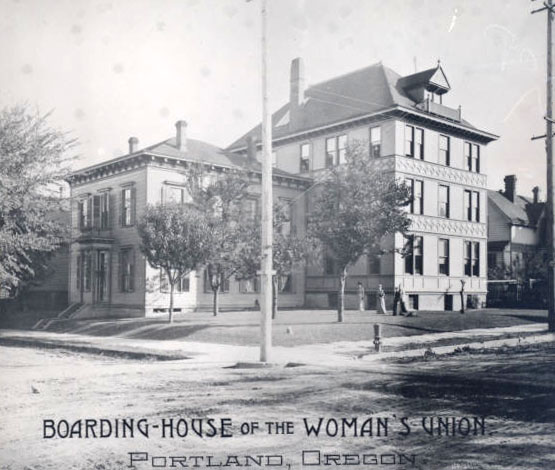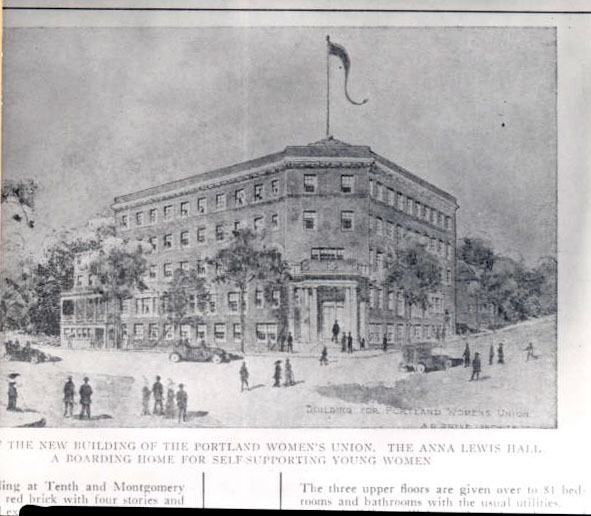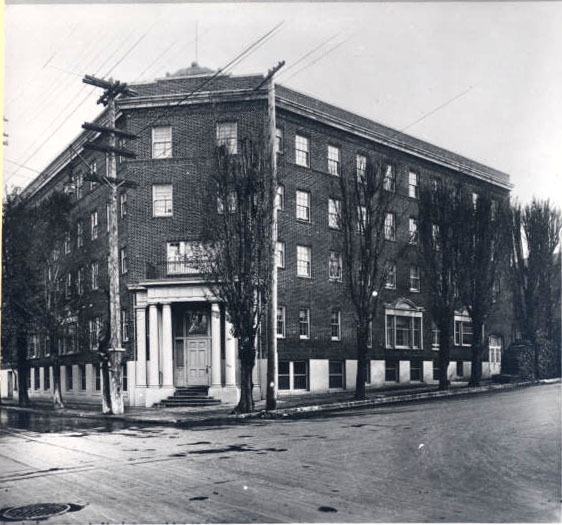The Portland Women’s Union was the first all-women volunteer organization in the state of Oregon. Its primary mission was to provide a safe and respectable residence for women coming to Portland until they found a job or became married.
The union was formed after a public talk in 1887 by Dr. Emma Welty urging Portland citizens to band together to protect young women from prostitution. On May 1, one hundred women—many of them the wives of prominent businessmen—gathered in the Unitarian chapel to discuss how they might help. By the end of the meeting, they had formed the Portland Women’s Union; elected their first president, Rosa F. Burrell; and decreed their purpose: “to forward and uphold the ideals and advancement of American womanhood, to establish a hotel for self-supporting young women coming as strangers to Portland, to provide counsel and assistance when necessary, and to minister to their well-being and happiness.” It cost a dollar to join the all-volunteer membership organization—the first of its kind in Oregon history.
The Portland Women’s Union began by opening a boarding house. They purchased the children’s home at Fifteenth and Flanders Streets, which had just been vacated for newer quarters, from the Ladies Relief Society for $2,000. The Ladies Relief Society paid the first year's rent for the Union. After refurbishing the building, within six months of the first meeting, the Union opened the boarding house to women residents. It was named Anna Lewis Hall, after Mrs. Mann (Lewis was her maiden name), a member of the Union who had donated the majority of the funds for the project.
There were no organized social services to support women in the city at the time, so the Union established Portland’s first night school, which offered classes in grammar, mathematics, and bookkeeping, and an industrial school, where women could learn gardening, sewing, and housekeeping skills. They hired a “depot matron” to direct young women to “respectable” housing and employment and worked with social agencies to begin the travelers’ aid program.
By 1895, the Union had organized the Women’s Exchange, which marketed articles and food made by local women. The Exchange began with tables in the Portland Hotel and at the YWCA. By 1903, it had a hundred consignors and had established a store at 133 Southwest Tenth Street. The profitable venture was soon incorporated into a separate organization, which relocated to Fourth and Alder Streets and lasted until the start of World War I.
In 1905, when Portland was the host city of the Lewis and Clark Centennial Exposition, the women of the Union furnished and staffed the Women’s Restroom. Most of the group's income came from running the boarding houses—Anna Lewis Hall and, later, the Martha Washington residence hotel. By 1917, the Union had returned to its original mission, which was running the boarding house for women. They focused on raising money and building and maintaining the Martha Washington Hotel until its sale in 1983.
In 1983, the Portland Women’s Union became the Portland Women’s Charitable Foundation; the name later changed to the Portland Women’s Foundation. In 2012, the foundation celebrated 125 years of investing in women and strengthening the greater Portland community. In September 2013, the Women's Care Foundation and the Portland Women's Foundation voted to join forces to form a new foundation that honors and builds on their respective heritages.
-
![]()
Anna Mann, c.1915.
Courtesy Oreg. Hist. Soc. Research Library, 015768
-
![NW 15th and Flanders, Portland. Women playing croquet on the lawn.]()
Boarding House, Portland Women's Union.
NW 15th and Flanders, Portland. Women playing croquet on the lawn. Courtesy Oreg. Hist. Soc. Research Library, 015788
-
![]()
Martha Washington, c.1917.
Courtesy Oreg. Hist. Soc. Research Library, OrHi54381
-
![]()
Martha Washington.
Courtesy Oreg. Hist. Soc. Research Library, OrHi54380
Related Entries
Map This on the Oregon History WayFinder
The Oregon History Wayfinder is an interactive map that identifies significant places, people, and events in Oregon history.
Further Reading
Read, Dr. E.J. Welty. Paper read before the Congregational Church, May 1910.
The Portland Women’s Union Archives and Records, Oregon Historical Society Research Library, Portland.
Plautz, Dana F. "The Martha Washington and the Women Who Built Her." Film, 2012. https://www.youtube.com/watch?v=HO6bkuCNTD8




